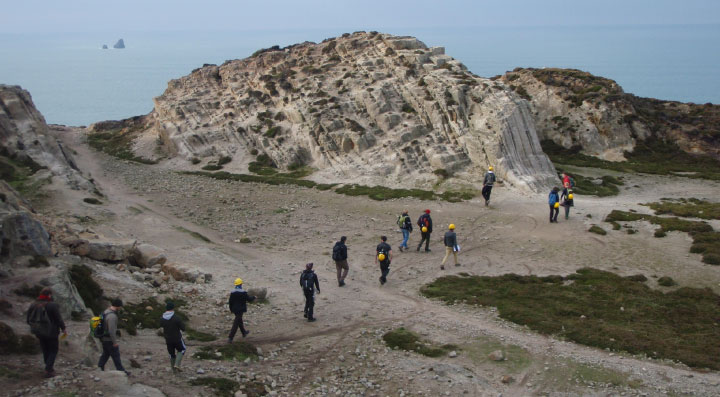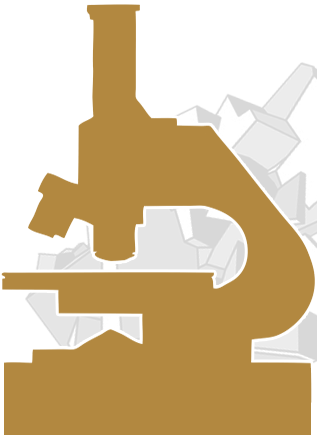During your degree: What to expect
Many school leavers want to know what life at university will be like. In a nutshell, it’s very like still being at school, only everything is scaled up. The university campus is large, there are thousands of other students, the class sizes are often enormous and the work always seems to take longer.
But don’t let that put you off - there is considerably more freedom compared to school, and so much opportunity to enjoy yourself. Many graduates say university was the best time of their lives.
But what’s involved in ‘going to university’? What do you actually have to do on a day-to-day basis when studying geoscience?
 Lectures
Lectures
In the autumn and spring terms you will usually study between 3 and 5 different subjects.
- These are usually run as separate classes that last anywhere from 1 to 3 hours once or twice a week
- Lectures are essentially just large classes (sometimes over 100 students) where a lecturer will run through a presentation and sometimes set an exercise
- Students are usually expected to make notes (or adapt the provided ones) during a lecture. Some universities provide lecture notes and others require student to print them off themselves.
- Some students also record lectures on their phones. Many universities now provide this facility and put the recorded lectures on their websites
- Exercises in lectures are often not assessed and it is up to the students how much effort they put into them. They can be good practice for exams.
- Generally there will be a number of graduate teaching assistants or ‘demonstrators’ to help. These are usually post-graduate students who undertake ad-hoc work helping with undergraduate classes.
Find out more about modules and timetables
 Coursework
Coursework
Most subjects will have an assessed coursework component:
- Coursework can contribute anything from 10% to over 50% of an individual subject. Occasionally some classes will be assessed by 100% coursework and no exam or, vice versa, by 100% exam and no coursework.
- Most coursework is essentially ‘homework’ – i.e. done outside of lectures.
- Coursework can vary from a series of shorter exercises or assignments that accumulate, or a single larger exercise, assignment or mini-project.
- Certain subjects may have field-based or laboratory-based assignments.
- Some classes may be in the form of a ‘tutorial’. These are often with a small group of students (less than 10) and a member of staff working through an exercise (or assessing an exercise previously set as homework).
 Exams
Exams
There are plenty of these at university!
![]() Usually exams are held after each term (2 or 3 times a year).
Usually exams are held after each term (2 or 3 times a year).
- Some universities hold exams at the end of each term while at other universities they take place after the Christmas and Easter holidays (this is more common).
- There may also be other exams during May/June for extra subjects taken during the summer term
- Some universities limit the number of exams to one set per year or even all at the end of a degree. This may mean fewer sets of exams, but it often results in students having to revise subjects they studied some time ago.
![]() You sit an exam in every subject that has an exam component:
You sit an exam in every subject that has an exam component:
- These are sat as individual or combined exams (2 or 3 subjects together)
- Generally exams get longer further into a degree
- They range from under an hour in length to sometimes over three hours (although these are relatively rare).
- Occasionally there may be practical exams (rock/fossil identification, laboratory techniques) and synoptic exams, which aim to draw on your entire knowledge of geoscience. Both only occur a few times during a degree.
![]() A significant difference between school and university exams is that many university exams offer a choice of questions to answer. For example, an exam paper may have a total of six questions but will state that the student only needs to answer any three of them. Some exam papers also have a mixture of 'compulsory' questions followed by a choice of other questions.
A significant difference between school and university exams is that many university exams offer a choice of questions to answer. For example, an exam paper may have a total of six questions but will state that the student only needs to answer any three of them. Some exam papers also have a mixture of 'compulsory' questions followed by a choice of other questions.
![]() The pass mark for most exams (and entire subjects) is 40%. Generally, you must pass the exam to pass an entire subject, even if your coursework grades are already high enough to pass. However, some exams, particularly in the 1st year, may have a higher pass mark (such as 60%) as they are considered vital to a successful degree.
The pass mark for most exams (and entire subjects) is 40%. Generally, you must pass the exam to pass an entire subject, even if your coursework grades are already high enough to pass. However, some exams, particularly in the 1st year, may have a higher pass mark (such as 60%) as they are considered vital to a successful degree.
 Dissertations, Mapping & Research projects
Dissertations, Mapping & Research projects
Field trips are a key aspect of undergraduate degrees and are normally carried out once or twice per year for anything from a single day to over two weeks. In 'classic' Geology degrees this culminates in an independent field-based Mapping Project.
Students on specialist courses and those studying 4-year MGeol or MSci degrees usually undertake an an independent research project instead.
After completion of a dissertation some universities will have an oral exam known as a ‘viva’ or a ‘defence’, during which your dissertation supervisor(s) and an additional member of staff ask you questions about your work. Usually these are aspects they are unsure of or things they would like you to confirm. An additional purpose is to check it’s your own work, as you should be very familiar with any dissertation you write.








